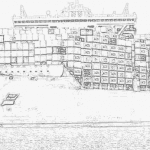Friday, June 25, 2021.
A little before noon, as the day hangs between morning and afternoon, in an emergency hospital room in New Delhi, I avert my eyes from its scrubby disarray to its furthest corner, to blank walls, empty, steel-framed beds and shuttered blinds, to their symmetric, white lines, hoping for the cohesion, the cool distance they show towards their surroundings.
But bordering, incubating, roiling images, sounds, smells and taste blur the bulwark I normally hold up against chaos.
Doctors, nurses, ward attendants, clipboards, IV bags, bandages, gusting air conditioners, burping life-support machines, jangles of medical equipment, hisses of pain, hacking coughs and a stinging stench of blood, vomit, urine, bleach, antiseptic and food…oscillate in a grisly, animated tableau, heave my stomach even as my just-downed coffee spirals as bile.
Shelter, respite, healing, hospitals carry the weight of such precepts. As I grapple with the bounds of my tunnel vision, I think it is laughable to expect anything like this within this polychromic nightmare. In a place outgrown of its original infrastructure, clogging the faculties of seeing and hearing. Where no one can tell me anything, not even where to wait. Where covid skulks in corridors. And where I am, like all others, an unbalanced fulcrum in a seesaw between life and death.
In the hours I am there, in my fogged mind, with my basic competencies made surreal even before arrival by an unknown caller, who urges me to rush as my “husband has been in an accident”, what I can say for certain of this space of supposed hygiene and expertise is this: it is a place of difficulty, where nothing looks or feels right, Or complete. It lacks the necessary arc for healing, one that advances intact from injury to recovery to rehabilitation.
After a lapse of time, I cannot for sure say how long, an earnest, skinny, bearded doctor, wearing the night’s weariness emerges asudden, through the hollows of my fragmented, panicked, convulsions, his stethoscope, a lab coat and ventilation mask in place. Seeing no one with me, he hesitates, then gestures to follow him.
As we enter another ward and he says, in a soft voice, “We could not save him from impact injuries. His head-on collision with a truck caused traumatic brain damage, internal bleeding and fractures to his spinal cord and ribs. They proved fatal before he came here.”
Then he is silent, his composure clenched, for comfort would be a lie.
Then in a startling movement, he draws open a bed’s white plastic curtain, where my thirty-year-old husband Praful lies, ejected by life, bloodied, brick-red in the face, glinting silver in parts they have been unable to clean up the shattered glass. And in a bit, with similar suddenness, the doctor drags the curtain close.
I take in the death rattle, its gut punch, the husk left of my husband, an image that evaporates from eyesight to settle in the minds-eye, as I do the changing shape of my ordeal.
Is his gesture intended as privacy-in-death? A polite signal for my departure? An odd favour to me, to think of what Praful’s life and death mean to me as our whole four-year marital existence? A cue, perhaps, to ponder on inescapable death, the only certainty and completeness one can encounter? Or is it a mandatory act required prior to his sign-off of exit papers?
My cell phone rings, texts alert me endlessly in the following hours. Both our parents are hysterical with anguish. His parents have a million questions about him, mine of a death certificate, funeral arrangements, priests. Clacking nurses’ shoes provide the tense background beat and crescendo.
In this netherworld, with shoe intonations manically alternating between click and clack, comes this thought: our marriage never had a real existence, it was dead, as he is now, at its very birth. That at its best, it was a dull union, incomplete in every manner of thought and action.
Driven into marriage at twenty-seven, without meaning to get involved, as my past had not quite left me while my career of teaching math was zipping forward, my experience was restrained to a presence in Praful’s life, silent, distracted and fidgety on most days, an annoying intruder on others.
I put away love, having played this dangerous, eccentric game once in my confined, watchful, distrustful world and chose from my parents’ offered profiles of men within my caste, class and community, vetted by three references of neighbour, business and peer and by very many unspoken rules. Of course, there is a right of refusal in arranged marriages, for this sort of on-the-table transaction, but a limit on the number of times you can exercise it.
I do not know Praful’s backstory, such discussions non-mandated in our partnership contained within a frugal warmth, within each’s half discs that never met. For him, perhaps, I did not so much choose him as I was the one he chose.
Today, in the hierarchy of my grief, I mourn for me, for him and at last for us. To the outside world, my mourning is that of a widow, in its finest essence, in its singleness of composure. Yet I am not in a void, in aloneness, in broken stairway helplessness, as people believe me to be in my social camouflage. Just in slightness.
So do my answers lie within?
In a puzzling mnemonic twist, Austrian logician Kurt Gödel comes to my mind. Of how his incompleteness theorems destroyed the search for a mathematical certainty of everything.
He argued any set of axioms you could posit as a possible foundation for math will inevitably be incomplete; there will always be true facts about numbers that cannot be proved by those axioms.
I think this Gödelian incompleteness afflicts not just math but is as yet an ill-understood way, my life, my reality. Is it everyone’s truth, not just mine? I can’t be sure.
Chitra Gopalakrishnan, a New Delhi-based journalist and a social development communications consultant uses her ardour for writing, wing to wing, to break firewalls between nonfiction and fiction, narratology and psychoanalysis, marginalia and manuscript and tree-ism and capitalism.









Leave a Reply